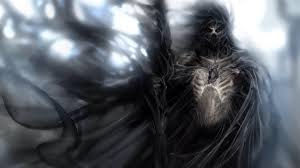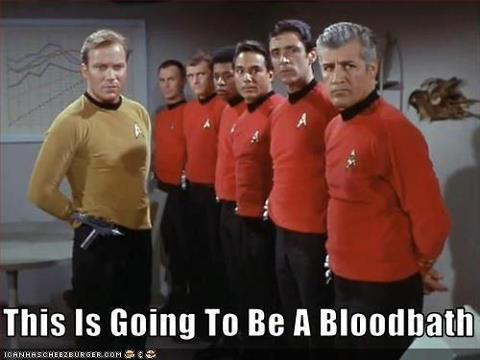 It’s often said that a writer is the god of their story, able to bestow or withhold life and dictate the fate of their characters. While this sounds like a megalomaniac’s dream, a writer will see this as a serious responsibility.
It’s often said that a writer is the god of their story, able to bestow or withhold life and dictate the fate of their characters. While this sounds like a megalomaniac’s dream, a writer will see this as a serious responsibility.
As a novelist, chances are you will eventually be faced with the prospect (or necessity) of killing off one of your characters. While writers like George R R Martin are able to do this without conscience, most writers are more squeamish.
The issue is not straightforward. Hollywood would have us believe that if you’re a bad person, you will get your come-uppance eventually. The hero can’t die. The one who everyone depends on cannot just up and croak it. The good guy will get the bad guy, not the other way around. Convention has taught us that important or favourite characters don’t die, yet real life writes another story. Real life heroes are often dead ones. Real life serial killers evade the police. The cowardly survive while the brave perish.
If you’re happy writing a sugar-sweet yarn rather than a realistic, gritty story, then by all means follow the Hollywood tradition. These days, however, particularly within the European market, readers prefer the latter.
For you as a writer, then, you may well find you asking yourself the dreaded question: ‘Who are you willing to kill?’
 In fiction there are the disposable (Redshirt) characters, the ones who enter the story only to show how dangerous a situation is by dying. Star Trek had this one nailed: if you’re on the away team and wearing a red shirt, you’re a dead man walking. This is a well-used get-out for writers of screen and page: it preserves your main characters, alerts your readers/audience (and characters) of the danger, and no one has a vested interest in them, so there’s no emotional wrench for the reader when the stooges meet their grisly fate.
In fiction there are the disposable (Redshirt) characters, the ones who enter the story only to show how dangerous a situation is by dying. Star Trek had this one nailed: if you’re on the away team and wearing a red shirt, you’re a dead man walking. This is a well-used get-out for writers of screen and page: it preserves your main characters, alerts your readers/audience (and characters) of the danger, and no one has a vested interest in them, so there’s no emotional wrench for the reader when the stooges meet their grisly fate.
Killing off a main character is not so simple. I’ve heard writers mention how they created a character who was meant to die, only to fall in love with them. Those ‘disposable’ characters survived. Similarly, a character who was intended to survive to the end of the story somehow makes the ultimate sacrifice before the final page.
Deciding whether or not a character lives to see the end of your novel is not straightforward. If that character has a unique skill set, killing them off means you no longer have those skills to call on in your plot. Their death will affect other characters and you have to deal with that, somehow. You also have to consider how that death influences the remainder of the story. Does it change it? Does it affect the remaining characters’ future motivations? Did they have knowledge or information that’s now lost to the other characters because they’re gone?
The problem, though, is not simply about how to handle the demise of an MC. You have to bear in mind the impact it has on your readers, too.
They might well get upset if a favorite character dies. This has the unwanted effect of potentially losing you that reader for the rest of the book, if not forever. Conversely, your reader might experience heightened jeopardy if they believe you are willing to kill your characters. They will keep reading avidly, in the hope that their favorite character will survive to the end.
Clearly, you have to make the right decision about who to kill. And it shouldn’t always be the villain. Killing a main character should not be done on a whim, or because you’ve grown bored with writing them (if you are, you need to look at that character again and figure out why). However, if there’s a good reason why a character should die, have the courage of your convictions, and go for it.



Reblogged this on demented darling and commented:
Another great post from Writers Anon-Taunton’s Writing Group! I’ve spent hours agonizing or gleaming at a possibly character’s death.
LikeLiked by 1 person
As weird as it sounds, as a story progresses, the characters tell me if they are supposed to die. I wrote a short story once where the MC ‘told’ me that the only way to resolve the conflict I had created was to let him croak. Nor was I allowed to bring him back.
Sometimes I feel like I’m just along for the ride. 🙂
LikeLiked by 2 people
Madalain – writing is a bit weird like that, sometimes. It’s almost like having a seance – is there anybody there? 🙂
LikeLiked by 1 person
LOL. I’m just channeling visions from an alternate dimension. 😀
LikeLiked by 1 person
This was one of the many issues with the last Twilight book. Nobody died, despite the enormous threat of these ancient vampires, built up over four books or whatever. The film tried to fix this, by giving us the battle scene that should have been, with at least one main character dying to great effect. Too bad, it was just a vision of a possible future, but it was a good way around the terrible source material.
If you’re not willing to kill anyone, but you’ve set-up a story with a big threat at it’s centre, your peril disappears and the whole thing becomes pointless. But then there are the writers who will kill anyone, any time, anywhere, which also has its risks.
LikeLike
I love this post and I cannot agree more with your last paragraph. I hate reading a story only to find out that a character dies or disappears for no reason.
LikeLiked by 1 person